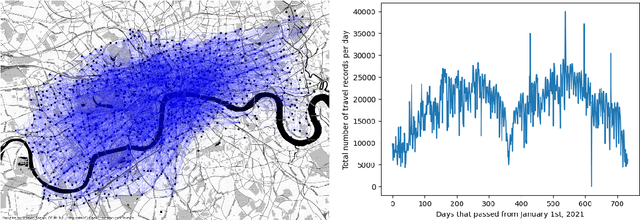Yuta Sato
CALT: A Library for Computer Algebra with Transformer
Jun 10, 2025Abstract:Recent advances in artificial intelligence have demonstrated the learnability of symbolic computation through end-to-end deep learning. Given a sufficient number of examples of symbolic expressions before and after the target computation, Transformer models - highly effective learners of sequence-to-sequence functions - can be trained to emulate the computation. This development opens up several intriguing challenges and new research directions, which require active contributions from the symbolic computation community. In this work, we introduce Computer Algebra with Transformer (CALT), a user-friendly Python library designed to help non-experts in deep learning train models for symbolic computation tasks.
Spatial Graph Coarsening: Weather and Weekday Prediction with London's Bike-Sharing Service using GNN
Aug 30, 2023



Abstract:This study introduced the use of Graph Neural Network (GNN) for predicting the weather and weekday of a day in London, from the dataset of Santander Cycles bike-sharing system as a graph classification task. The proposed GNN models newly introduced (i) a concatenation operator of graph features with trained node embeddings and (ii) a graph coarsening operator based on geographical contiguity, namely "Spatial Graph Coarsening". With the node features of land-use characteristics and number of households around the bike stations and graph features of temperatures in the city, our proposed models outperformed the baseline model in cross-entropy loss and accuracy of the validation dataset.
Mesh-Wise Prediction of Demographic Composition from Satellite Images Using Multi-Head Convolutional Neural Network
Aug 25, 2023



Abstract:Population aging is one of the most serious problems in certain countries. In order to implement its countermeasures, understanding its rapid progress is of urgency with a granular resolution. However, a detailed and rigorous survey with high frequency is not feasible due to the constraints of financial and human resources. Nowadays, Deep Learning is prevalent for pattern recognition with significant accuracy, with its application to remote sensing. This paper proposes a multi-head Convolutional Neural Network model with transfer learning from pre-trained ResNet50 for estimating mesh-wise demographics of Japan as one of the most aged countries in the world, with satellite images from Landsat-8/OLI and Suomi NPP/VIIRS-DNS as inputs and census demographics as labels. The trained model was performed on a testing dataset with a test score of at least 0.8914 in $\text{R}^2$ for all the demographic composition groups, and the estimated demographic composition was generated and visualised for 2022 as a non-census year.
 Add to Chrome
Add to Chrome Add to Firefox
Add to Firefox Add to Edge
Add to Edge